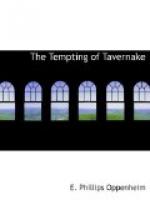“But, Tavernake, look here!” the lawyer protested, springing to his feet. “I say, Tavernake!” he called out.
But Tavernake heard nothing, or, if he heard, he took no notice. He walked out into the street and was lost among the hurrying throngs upon the pavements.
BOOK TWO
CHAPTER I
NEW HORIZONS
Towards the sky-line, across the level country, stumbling and crawling over the deep-hewn dikes, wading sometimes through the mud-oozing swamp, Tavernake, who had left the small railway terminus on foot, made his way that night steadily seawards, as one pursued by some relentless and indefatigable enemy. Twilight had fallen like a mantle around him, fallen over that great flat region of fens and pastureland and bog. Little patches of mist, harbingers of the coming obscurity, were being drawn now into the gradual darkness. Lights twinkled out from the far-scattered homesteads. Here and there a dog barked, some lonely bird seeking shelter called to its mate, but of human beings there seemed to be no one in sight save the solitary traveler.
Tavernake was in grievous straits. His clothes were caked with mud, his hair tossed with the wind, his cheeks pale, his eyes set with the despair of that fierce upheaval through which he had passed. For many hours the torture which had driven him back towards his birthplace had triumphed over his physical exhaustion. Now came the time, however, when the latter asserted itself. With a half-stifled moan he collapsed. Sheer fatigue induced a brief but merciful spell of uneasy slumber. He lay upon his back near one of the broader dikes, his arms outstretched, his unseeing eyes turned toward the sky. The darkness deepened and passed away again before the light of the moon. When at last he sat up, it was a new world upon which he looked, a strange land, moonlit in places, yet full of shadowy somberness. He gazed wonderingly around—for the moment he had forgotten. Then memory came, and with memory once more the stab at his heart. He rose to his feet and went resolutely on his way.
Almost until the dawn he walked, keeping as near as he could to that long monotonous line of telegraph posts, yet avoiding the road as much as possible. With the rising of the sun, he crept into a wayside hovel and lay there hidden for hours. Hunger and thirst seemed like things which had passed him by. It was sleep only which he craved, sleep and forgetfulness.
Dusk was falling again before he found himself upon his feet, starting out once more upon this strangely thought-of pilgrimage. This time he kept to the road, plodding along with tired, dejected footsteps, which had in them still something of that restless haste which drove him ceaselessly onward as though he were indeed possessed of some unquiet spirit. He was recovering now, however, a little of his natural




